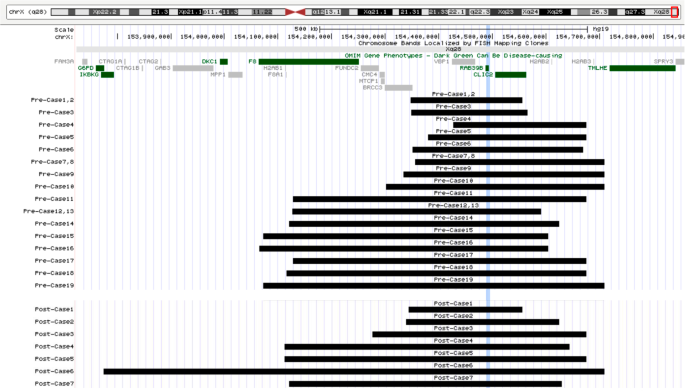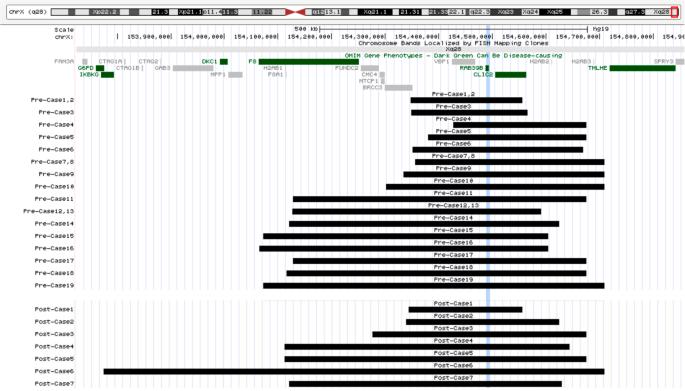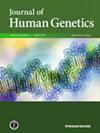Exploring inheritance, and clinical penetrance of distal Xq28 duplication syndrome: insights from 47 new unpublished cases
IF 2.6
3区 生物学
Q2 GENETICS & HEREDITY
引用次数: 0
Abstract
Distal Xq28 duplication, or int22h1/int22h2-mediated Xq28 duplication syndrome, leads to cognitive impairment, neurobehavioral issues, and facial dysmorphisms. Existing literature has limited information on clinical traits and penetrance. We identified cases of distal Xq28 duplication (chrX: 154,126,575–154,709,680, GRCh37/hg19) through a review of clinical records and microarray reports from five centers, encompassing both postnatal and prenatal cases, with no prior family knowledge of the duplication. Our search found 47 cases across 26 families, with duplications ranging from 208 to 935 Kb. In total, 8 out of 26 index cases featured a 200–300 kb partial duplication, mainly from Armenian/Caucasian Jewish backgrounds. Most prenatal cases showed no major fetal ultrasound malformations. Of cases with known inheritance mode (15 out of 26), maternal inheritance was more common (80%). The study identified seven male carriers of the duplication from six unrelated families, indicating partial penetrance in males. Our study provides key insights into distal Xq28 duplication. Most prenatal tests showed no major fetal ultrasound issues. Maternal inheritance was common, with unaffected mothers. In the postnatal group, a balanced gender distribution was observed. Among male family members, two fathers had ADHD, one was healthy, and one brother had mild symptoms, indicating partial penetrance in males.


探索远端Xq28重复综合征的遗传和临床渗透性:从47个未发表的新病例中获得的启示
背景远端 Xq28 重复或 int22h1/int22h2- 介导的 Xq28 重复综合征会导致认知障碍、神经行为问题和面部畸形。方法我们通过查阅五个中心的临床记录和微阵列报告,发现了远端 Xq28 重复(chrX:154,126,575-154,709,680,GRCh37/hg19)病例,其中包括产后和产前病例,且患者家族事先并不知晓该重复。在 26 个索引病例中,共有 8 个病例有 200-300 kb 的部分重复,主要来自亚美尼亚/高加索犹太人背景。大多数产前病例未发现胎儿超声畸形。在已知遗传模式的病例中(26 例中有 15 例),母系遗传更为常见(80%)。该研究从 6 个无血缘关系的家庭中发现了 7 名男性重复携带者,表明男性有部分渗透性。大多数产前检查显示胎儿超声检查无重大问题。母体遗传很常见,母亲未受影响。在产后组中,性别分布均衡。在男性家庭成员中,两位父亲患有多动症,一位父亲身体健康,一位兄弟有轻微症状,这表明多动症在男性中具有部分渗透性。
本文章由计算机程序翻译,如有差异,请以英文原文为准。
求助全文
约1分钟内获得全文
求助全文
来源期刊

Journal of Human Genetics
生物-遗传学
CiteScore
7.20
自引率
0.00%
发文量
101
审稿时长
4-8 weeks
期刊介绍:
The Journal of Human Genetics is an international journal publishing articles on human genetics, including medical genetics and human genome analysis. It covers all aspects of human genetics, including molecular genetics, clinical genetics, behavioral genetics, immunogenetics, pharmacogenomics, population genetics, functional genomics, epigenetics, genetic counseling and gene therapy.
Articles on the following areas are especially welcome: genetic factors of monogenic and complex disorders, genome-wide association studies, genetic epidemiology, cancer genetics, personal genomics, genotype-phenotype relationships and genome diversity.
 求助内容:
求助内容: 应助结果提醒方式:
应助结果提醒方式:


